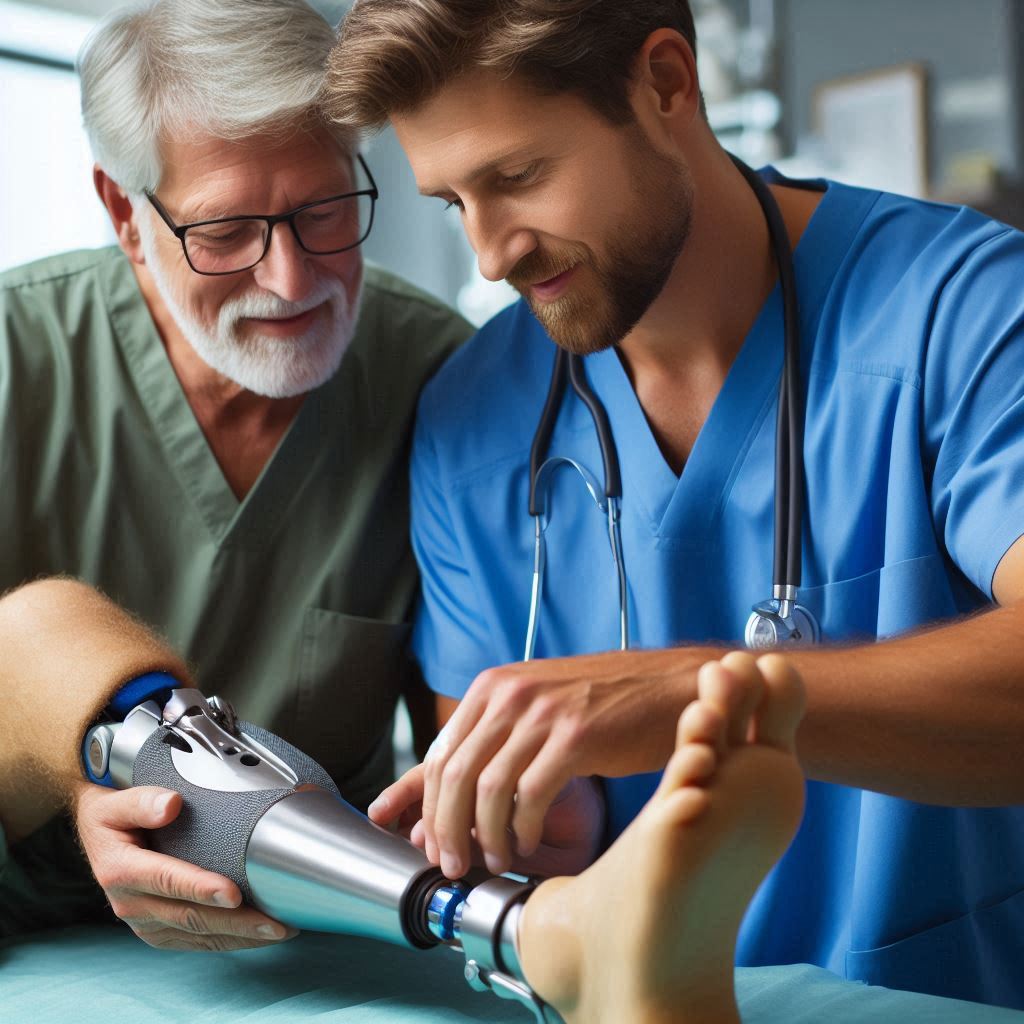Introduction
An orthopedic technologist plays a vital role in healthcare.
They assist orthopedic surgeons in treating musculoskeletal conditions.
Their duties include applying and removing casts, braces, and splints.
They ensure these devices fit correctly to support healing.
Orthopedic technologists prepare patients for surgery.
They position patients and set up necessary equipment.
Their knowledge of sterile techniques maintains a safe surgical environment.
This preparation is crucial for successful surgeries.
In addition, orthopedic technologists educate patients.
They teach patients how to care for their casts and braces.
They explain what to expect during recovery.
This education helps patients follow their treatment plans.
Orthopedic technologists also perform diagnostic procedures.
They assist with taking X-rays and preparing patients for MRIs.
This assistance allows for accurate diagnoses and effective treatment plans.
Orthopedic technologists handle administrative tasks as well.
They maintain patient records and order supplies.
They ensure equipment is properly maintained.
This administrative support keeps orthopedic departments running smoothly.
Their role extends beyond technical skills.
Orthopedic technologists provide emotional support to patients.
They help ease anxiety about treatments and surgeries.
Their compassionate care builds trust with patients.
The importance of orthopedic technologists in the healthcare system cannot be overstated.
They bridge the gap between surgeons and patients.
Their expertise ensures comprehensive orthopedic care.
Orthopedic technologists play a crucial role in surgery.
They provide hands-on support during procedures.
This support helps surgeries run smoothly and efficiently.
Their expertise allows surgeons to focus on complex aspects of care.
Morning Routine
As an orthopedic technologist, my day typically starts bright and early.
One of the first things I do in the morning is to review my schedule for the day.
This helps me mentally prepare for the patients I will be seeing and the procedures I will be assisting with.
Once I have a good idea of what my day will look like, I head to the locker room to change into my scrubs.
It’s essential to have a clean and professional appearance in this line of work, as it helps build trust with patients and colleagues.
Typical Morning Tasks
- Set up equipment for the day’s surgeries and procedures
- Review patient charts to familiarize myself with their medical history
- Check inventory and restock supplies as needed
- Attend morning meetings to discuss the day’s cases and any special considerations
After completing these tasks, I head to the OR or clinic where I organize my workspace. Having a well-organized and clean working environment is crucial for efficiency and patient safety.
Importance of Preparation
Preparation is key in the field of orthopedic technology.
It ensures that surgeries and procedures run smoothly and that patients receive the best possible care.
By taking the time to prepare in the morning, I am setting myself up for success throughout the day.
Organizing Workspace and Equipment
When organizing my workspace, I make sure that all necessary equipment is readily accessible.
This includes tools such as casts, splints, and braces, as well as any disposable items needed for procedures.
I also ensure that everything is clean and sterilized to maintain a sterile environment.
Additionally, I double-check that all equipment is in good working order to avoid any delays during surgeries or procedures.
Proper organization and maintenance of equipment are essential for providing efficient and high-quality care to patients.
With my morning routine complete and my workspace organized, I am ready to face whatever challenges and opportunities the day may bring as an orthopedic technologist.
Read: Understanding Ultrasound Technician Certifications
Patient Interaction
How Orthopedic Technologists Interact with Patients
Orthopedic technologists interact with patients throughout their day.
They greet patients, explain procedures, and answer questions.
This interaction starts from the moment patients arrive.
Orthopedic technologists take patient histories and assist with physical exams.
They gather information on medical conditions and treatment history.
This information helps guide the treatment process.
During procedures, orthopedic technologists explain each step to patients.
They describe how casts, braces, or splints will be applied.
Clear explanations help patients feel more at ease.
The Importance of Building Rapport and Trust with Patients
Building rapport with patients is crucial.
Trust and comfort are essential for effective treatment.
Patients must feel confident in their technologist’s abilities.
Orthopedic technologists use empathy to build trust.
They listen to patient concerns and respond with understanding.
Empathy helps patients feel valued and understood.
Effective communication skills are essential.
Orthopedic technologists must explain complex medical information clearly and simply.
This ensures patients understand their treatment plans.
Patience is another vital skill.
Some patients may feel anxious or scared.
Orthopedic technologists must remain calm and patient, offering reassurance.
The Skills Needed to Effectively Communicate with Patients
Nonverbal communication also plays a role.
Body language and facial expressions can convey empathy and understanding.
Orthopedic technologists use these cues to build rapport.
Active listening is crucial.
Orthopedic technologists must pay attention to what patients say and respond appropriately.
This skill helps address patient concerns effectively.
Education is a key part of patient interaction.
Orthopedic technologists teach patients how to care for their casts and braces.
Proper care instructions prevent complications and promote healing.
They also explain what to expect during recovery.
Clear expectations help patients prepare mentally and physically for the healing process.
This reduces anxiety and improves compliance with treatment plans.
Orthopedic technologists must be adaptable.
Each patient is unique and may require different communication approaches.
Flexibility helps meet individual patient needs.
Cultural competence is important as well.
Understanding and respecting cultural differences enhances patient interactions.
Orthopedic technologists must be aware of cultural sensitivities and adjust their communication accordingly.
Orthopedic technologists also support patients emotionally.
They provide comfort and reassurance during stressful times.
Emotional support is crucial for patient well-being.
Confidentiality is a must.
Patients trust orthopedic technologists with personal information.
Maintaining confidentiality is essential for building and maintaining trust.
Collaboration with other healthcare professionals is also important.
Orthopedic technologists work with doctors, nurses, and therapists.
Effective teamwork ensures comprehensive patient care.
In summary, patient interaction is a core part of an orthopedic technologist’s role.
Building rapport and trust with patients is essential.
Empathy, effective communication, and cultural competence are key skills.
Orthopedic technologists educate, support, and care for patients throughout their treatment journey.
These interactions significantly impact patient outcomes and satisfaction.
Read: Ultrasound Technician vs. Radiologic Technologist
Assisting in Procedures
Orthopedic technologists play a crucial role during orthopedic procedures in hospitals and surgical centers.
They assist orthopedic surgeons before, during, and after surgeries, ensuring smooth operations and patient comfort.
The Role of an Orthopedic Technologist During Orthopedic Procedures
During procedures, orthopedic technologists prepare the operating room and equipment.
They sterilize instruments and set up surgical trays according to protocols.
This meticulous preparation ensures a sterile environment and smooth workflow.
Orthopedic technologists assist surgeons during procedures by passing instruments, sutures, and implants.
They anticipate the surgeon’s needs, maintaining focus and efficiency throughout the surgery.
Clear communication with the surgical team is essential to ensure seamless coordination.
The Importance of Following Protocols and Assisting the Orthopedic Surgeon
Following protocols is critical to maintaining patient safety and achieving successful outcomes.
Orthopedic technologists adhere to strict sterilization and infection control measures.
They ensure all equipment is functioning correctly and ready for use.
Assisting the orthopedic surgeon involves precise timing and coordination.
Technologists must be attentive to the surgeon’s instructions and anticipate next steps.
This proactive approach minimizes delays and enhances surgical efficiency.
How They Ensure the Safety and Comfort of the Patient During Procedures
Patient safety and comfort are top priorities for orthopedic technologists.
They position patients correctly on the operating table, ensuring optimal exposure for the surgeon while maintaining patient comfort and dignity.
During procedures, technologists monitor the patient’s vital signs and response to anesthesia.
They remain alert for any signs of distress or complications, promptly alerting the surgical team if needed.
This vigilance contributes to patient safety throughout the surgery.
Orthopedic technologists also assist in wound closure and dressing application.
They provide post-operative care instructions to patients and caregivers, ensuring they understand how to promote healing and prevent complications.
Generally, orthopedic technologists play a vital role in the operating room environment.
During orthopedic procedures, they assist surgeons by preparing equipment, following strict protocols, and ensuring patient safety and comfort.
Their attention to detail, teamwork, and commitment to quality care contribute to successful surgical outcomes and patient satisfaction.
Orthopedic technologists make significant contributions to the healthcare team, supporting surgeons and enhancing the overall patient experience during orthopedic procedures.
Read: Preparing for a Sonography Job Interview: Tips

Technological Skills
Orthopedic technologists rely on a range of technical skills to perform their duties effectively.
These skills are crucial for ensuring accurate patient care and support in orthopedic settings.
Outline the Technical Skills Required for the Job
Technical proficiency is essential for orthopedic technologists.
They must be adept at operating medical equipment such as X-ray machines, MRI scanners, and ultrasound devices.
Proficiency in maintaining and troubleshooting equipment is also vital.
Orthopedic technologists are trained in sterile technique and infection control protocols.
They ensure all equipment and instruments are sterile and ready for use during procedures.
Attention to detail and adherence to safety standards are paramount.
How They Use Imaging Technology Such as X-rays or MRI Machines
Imaging technology plays a pivotal role in orthopedic diagnosis and treatment planning.
Orthopedic technologists capture X-ray images to assess bone fractures, joint alignment, and implant positioning.
They position patients correctly and adjust equipment settings to obtain clear images.
MRI machines are utilized to visualize soft tissues, ligaments, and cartilage.
Technologists prepare patients for MRI scans, ensuring their comfort and safety during the procedure.
They collaborate with radiologists to capture high-quality images for accurate diagnosis.
The Importance of Staying Updated on New Technologies in the Field
Staying abreast of technological advancements is essential for orthopedic technologists.
New technologies enhance diagnostic accuracy, surgical precision, and patient outcomes.
Technologists attend training sessions and workshops to learn about new equipment and techniques.
Advancements in imaging technology, such as digital radiography and 3D imaging, improve visualization and reduce radiation exposure.
Technologists integrate these technologies into their practice to provide superior patient care.
Being informed about new orthopedic devices and implants is crucial.
Technologists assist surgeons in selecting and preparing implants for procedures.
They ensure compatibility and functionality, contributing to successful surgical outcomes.
All in all, orthopedic technologists possess a diverse skill set that includes technical proficiency, imaging technology expertise, and a commitment to continuous learning.
They play a vital role in orthopedic healthcare by utilizing advanced equipment like X-ray and MRI machines to assist in diagnosis and treatment planning.
By staying updated on new technologies and techniques, orthopedic technologists enhance their ability to deliver quality care and support positive patient outcomes.
Their dedication to technical excellence and innovation contributes to the overall success of orthopedic procedures and patient satisfaction.
Read: Continuing Education for Surgical Technologists: Why It Matters
Transform Your Career Today
Unlock a personalized career strategy that drives real results. Get tailored advice and a roadmap designed just for you.
Start NowTeamwork and Collaboration
Teamwork is fundamental in the dynamic environment of orthopedic healthcare.
Orthopedic technologists collaborate closely with various healthcare professionals to ensure optimal patient care and successful outcomes.
The Importance of Teamwork in an Orthopedic Setting
In orthopedic settings, teamwork is essential for seamless operations.
Technologists work alongside orthopedic surgeons, nurses, anesthesiologists, and other specialists.
Each team member contributes unique skills and expertise to enhance patient care.
How Orthopedic Technologists Work Closely with Surgeons, Nurses, and Other Healthcare Professionals
Orthopedic technologists support surgeons throughout procedures by anticipating needs and providing assistance.
They prepare surgical instruments, handle implants, and maintain a sterile field.
Technologists communicate effectively with nurses to coordinate patient care and ensure safety.
Collaboration extends beyond the operating room.
Technologists consult with radiologists to interpret imaging results and assist in treatment planning.
They collaborate with physical therapists to facilitate patient rehabilitation and recovery.
How Effective Communication and Collaboration Are Essential for Patient Care
Effective communication is crucial for patient safety and treatment efficacy.
Orthopedic technologists communicate clearly with the surgical team, conveying critical information and updates during procedures.
This ensures everyone is informed and prepared for each step.
Collaboration enhances care coordination.
Technologists coordinate with nurses to monitor patients post-operatively, assessing vital signs and managing pain.
They provide continuity of care by documenting procedures and patient responses accurately.
Team collaboration improves patient outcomes.
Technologists contribute insights and observations that support informed decision-making.
They advocate for patient comfort and well-being throughout the surgical process.
Essentially, orthopedic technologists play a pivotal role in a collaborative healthcare team dedicated to orthopedic care.
Their teamwork with surgeons, nurses, and other professionals ensures comprehensive patient care from diagnosis through recovery.
Effective communication and collaboration are essential for maintaining safety, efficiency, and quality in orthopedic procedures.
Orthopedic technologists exemplify dedication to teamwork, contributing expertise that enhances patient outcomes and satisfaction.
Their role underscores the importance of coordinated efforts and mutual respect in delivering exceptional orthopedic healthcare services.
Continuing Education
Continuing education is crucial for orthopedic technologists to maintain proficiency and stay updated in their field.
The Importance of Continuing Education for Orthopedic Technologists
Continuing education ensures orthopedic technologists remain knowledgeable about advancements in technology and procedures.
It enhances their skills and keeps them informed of best practices.
How They Stay Current with Advancements in the Field
Technologists attend workshops, seminars, and conferences to learn about new techniques and technologies.
They engage in online courses and webinars for convenient access to updated information.
Staying informed through medical journals and publications allows technologists to integrate new knowledge into their practice.
They discuss cases and share insights with colleagues to exchange ideas and strategies.
The Various Opportunities for Professional Development and Advancement
Professional development opportunities include certification programs such as NBCOT and ASOP, which offer specialized training and credentials.
Technologists pursue advanced certifications to expand their scope of practice.
Participation in research projects and clinical trials allows technologists to contribute to advancements in orthopedic care.
They collaborate with healthcare teams to implement innovative practices and improve patient outcomes.
Networking with peers and industry professionals fosters collaboration and mentorship.
Technologists join professional organizations like NAOT to access resources, workshops, and networking events.
Most importantly, continuing education is essential for orthopedic technologists to excel in their careers and provide high-quality patient care.
Staying current with advancements through education and collaboration ensures technologists remain competent and adaptable in a rapidly evolving field.
Professional development opportunities, including certifications, research involvement, and networking, empower technologists to advance their skills and contribute to advancements in orthopedic healthcare.
By embracing lifelong learning, orthopedic technologists uphold standards of excellence and innovation in their profession.
Conclusion
The day in the life of an orthopedic technologist is dynamic and demanding.
These professionals play a vital role in assisting orthopedic surgeons during procedures, ensuring the safety and well-being of patients.
From preparing the operating room to providing post-operative care, orthopedic technologists are instrumental in the patient’s journey to recovery.
Orthopedic technologists are essential members of the healthcare team, working closely with orthopedic surgeons, nurses, and other medical staff to deliver high-quality care to patients.
Their attention to detail, technical skills, and compassion make a significant impact on patient outcomes and overall satisfaction.
For those considering a career in orthopedic technology, the rewards are abundant.
The opportunity to make a difference in patients’ lives, the chance to continuously learn and grow in a specialized field, and the satisfaction of knowing that you are an integral part of the healthcare industry are just a few reasons to pursue this path.
As the demand for orthopedic procedures continues to rise, orthopedic technologists will play an increasingly crucial role in delivering efficient and effective patient care.
If you have a passion for helping others and a desire to work in a fast-paced, rewarding environment, consider a career in orthopedic technology – the possibilities are endless!




